40 Ways to Save 40 Percent of Your Paycheck
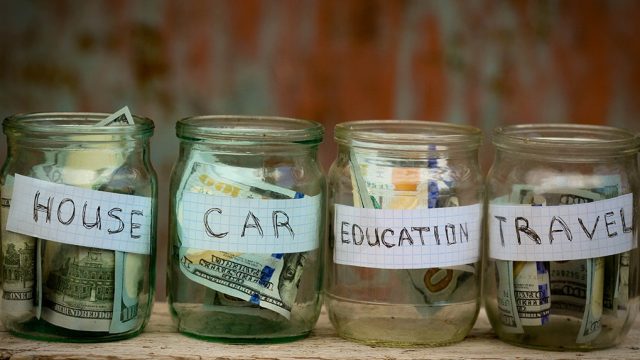
‘Tis the season to panic about your expenditures. If looking at your holiday credit card bill and your paycheck are giving you an anxiety attack, it may be time to reevaluate how you’re spending your money and what you could be doing to save a bit more. You’ve probably tried setting down a budget or cutting back here and there, all to no avail. Hey, it happens. But it’s likely there are some money-saving strategies you have yet to consider. We spoke with a handful of experts and pulled together 40 ideas to help you put more of that salary into savings. And for more financial advice for the coming year, check out the 52 Easy Ways to Be Smarter with Money in 2018.
1
Use a Money-Tracking App

Carla Dearing, CEO of Sum180, an online financial wellness service, suggests using an online money tracking service, like Mint or Quicken, to see all your financial accounts in one place and even create your first budget.
“Doing this, you will always know where you stand financially,” she says. “Mint, for example, gives you complete access to your data through the website and your mobile device, whether you use iOS or Android. Better yet, Mint keeps an eye on your money for you. It even sends alerts to remind you to pay your bills or when you go over budget.” And for more ways to boost your savings, here’s how to Earn $500,000 in Your Spare Time.
2
Find a Savings Buddy

Like working out or going for a hike in the woods, saving money is often most effective when done with a friend. If you have a friend or colleague who is setting similar goals for their savings, help hold each other accountable, discussing your respective goals and tracking your progress. You are far more likely to stick to your plan knowing you have to discuss it with someone else at the end of the month. And for more great advice, here are 52 Ways to Be Smarter with Money in 2018.
3
Cut Out Two Monthly Expenses

“Identify two or three regular monthly expenses that you can do without—then delete them,” Dearing adds. “For one person, the eliminated expense may be premium cable and a too-generous data plan. For another, it may be online shopping and extra spending on eating out. Be creative so you don’t feel deprived.”
4
Review Your Cable Bill

“You may be able to save more money by using an unlimited data plan for your mobile provider and then using a Google Chromecast to watch all your shows on your TV,” says J.R. Duren, a personal finance expert at HighYa.com. “If you want live TV, an HD antennae should give you access to all your favorite network shows and football on Saturdays and Sundays.” And for more ways to save a buck, here are the 20 Secrets Salespeople Don’t Want You to Know.
5
Review Your Gym Membership

Likewise, Duren points to gym memberships as areas you could be cutting back on significantly.
“Gyms will try and sell you on their amenities, talking up their classes, basketball courts and pools,” he says. “But, unless you’re already playing court-related sports or swimming, there’s a good chance you won’t use the gym’s courts or pools. Classes are always a big draw but, the truth is, most of us won’t attend unless we have a friend go with us.”
Instead of gyms with all the fancy amenities, he recommends a budget-friendly alternative like Planet Fitness or Snap Fitness, “both of which have memberships for $10 a month.”
6
Buy a Programmable Thermostat

Getting more efficient about energy use is one of the simplest ways to take a chunk off your monthly expenses. A programmable thermostat allows you to heat or cool your home at the times you choose, avoiding wasteful use and unnecessary expenditures. And for great investing advice, know these 5 Top Millionaire Money Secrets You Can Use.
7
Draw the Line Between Wants and Needs

“What do we really need? Stop and think about it and get clarity for yourself,” says Pamela Yellen, a financial investigator and the author of two New York Times best-selling books, including the latest, The Bank on Yourself Revolution: Fire Your Banker, Bypass Wall Street, and Take Control of Your Own Financial Future.
Go through your credit card bill or bank statement for a month and make a “W” or “N” next to each item—chances are there will be many more of the former than the latter. The difference should help make clear how much you can cut and will be a valuable exercise as you make day-to-day decisions about what to spend your money on.
“And if you have children, teaching them the difference between needs and wants will empower them for life,” Yellen adds.
8
Distinguish Big Happy from Little Happy

“The Big Happy for most of us is having memorable experiences and being with the people we love,” explains Yellen. “That other stuff we chase? That’s usually Little Happy—fleeting and not very fulfilling.”
Getting a hugely fancy meal for lunch might be satisfying, but unlikely to provide you with real long-term fulfillment. On the other hand, spending money to see a show you and your spouse have been excited to see might be the kind of long-term fun that strengthens a relationship. Pick your spending battles.
9
Make Eating Out a Treat

“If you love to eat out, challenge yourself to make delicious meals at home six nights a week,” says Dearing. “Your one restaurant meal per week will feel more special and you’ll save a ton of money.”
Not only will you scale back your spending, you’ll get much more out of the night when you do eat out. If you eat out too much to make one night a week a realistic goal, try simply cutting the number of nights you eat out in half—eat out three times instead of six, and see how you feel. “The Bureau of Labor Statistics says the average American household spends about $262 a month dining out,” says Duren. “Cutting your restaurant budget in half can probably save you at least $100 a month.” And if you’re splurging, know that a fancy meal at home in one of the Best Ways to Surprise Your Wife.
10
Know Your Spending Triggers

“When you have a rough day at work, do you crave some retail therapy to feel better? Are you triggered to overspend in a bookstore, hardware store, or swap meet?” asks Yellen.
Once you identify the circumstances when you tend to make unnecessary purchases, you can work to rewire your behavior, perhaps avoiding those places you are most likely to spend, leaving your credit cards at home when you will be going to a place where temptation might take effect, or some other strategy. “‘Know thyself’—and especially know your spending triggers so you can outwit them,” says Yellen. And for more ways to know thyself, here are 70 Genius Tricks to Boost Your Confidence.
11
Try a No-Spend Month

While a radical change in your spending, just like a radical change in your eating, is unlikely to result in a sustainable difference of behavior, it may be worth kicking off your spending reduction with a bang by trying what Dearing calls a “No-Spend Month.”
“This exercise can make a big difference in your personal balance sheet,” explains Dearing. “It’s simple: commit to a 30-day period of spending only on necessities. Walk or bike to everywhere instead of driving; take lunch to work every day; embrace free entertainment options, like exploring local parks. Not only will you save a lot of money during this one-month period, you may find yourself re-evaluating old spending habits altogether and deciding you prefer your own creative, low-cost alternatives.”
For most, just doing one or two of these spending cuts would be challenge enough, but if you’re the type who likes to go big, a full spending diet might be an instructive practice.
12
Ask for a Lower Credit Card Rate

How long has it been since you called your credit card company and asked them to lower your rate? There’s a good chance they would rather lower your rate a few percentage points if it means the difference of keeping you as a customer or not. And once you’ve done that, Steal the Winklevoss Twins’ Secrets for Success.
13
Refinance Student Loans

If you’re still chipping away at that balance going back to undergrad, consider reaching out to your loan servicing company and looking into a refinancing option. “When you refinance your student loans, you’ll have one consolidated loan with a single monthly payment and a lower interest rate, which is important as more of each payment goes toward paying down the balanced owed,” explains Dearing.
She suggests companies like Social Finance as one with a strong refinancing offering, and, to do a deeper dive on the topic, checking out Student Loan Hero’s “The Ultimate Guide to Paying Off Student Loans Faster.”
14
Consider a HELOC

If you are looking for ways to cut down on your debt but also own a home with some equity in it, you might also consider a home equity line of credit (HELOC), which are often significantly lower than what you would pay on a credit card.
“By paying off the credit card and moving that balance to a HELOC, you’ve reduced the amount of interest that will stack up and will be able to pay off the debt more quickly as a result,” says Dearing.
15
Wrap Your Cards

While plenty of financial advisors will suggest leaving credit cards at home or even cutting them up to avoid temptation, Yellen has a more big-picture approach. “I prefer to wrap my cards in my goals,” she says. “Every time I take a card out, I see a picture or some words that represent a goal that’s important to me. I get the opportunity to stop and decide whether what I’m about to purchase is more important than that goal.”
Think about what you’d like to be saving your money for, or what you want to be spending it on—a vacation, a new car, your kid’s college. Whatever it is, a look at it might be enough to remind you why it’s worth skipping that second latte of the day.
16
Bake in Bulk

Get into the habit of cooking up a big casserole or lasagna (or a big slow cooker of chili) and eating it for lunch several days in a row. Buying and preparing a big batch of anything is going to get you more value in the long run (and require much less work) than trying to make a new meal each day.
17
Deep Freeze

If you get into making your lunch a week at a time, there’s no reason not to extend this by investing in a deep freezer, allowing you to buy in bulk and have food ready to go year round. It will save you a ton of money in the long run.
18
Flex Your Saving Muscle

“Next time you feel the urge to buy something you hadn’t planned to buy, simply clench your fist or flex your bicep,” says Yellen. “Voila! The spell is broken and you can actually think clearly again.”
Alternately, you can put a rubber band on your wrist and snap it when you feel the desire to pull out your wallet. The tactic is often effective with breaking bad habits, and can sometimes work to curb bad spending habits, too.
19
Create a Zero-Based Budget
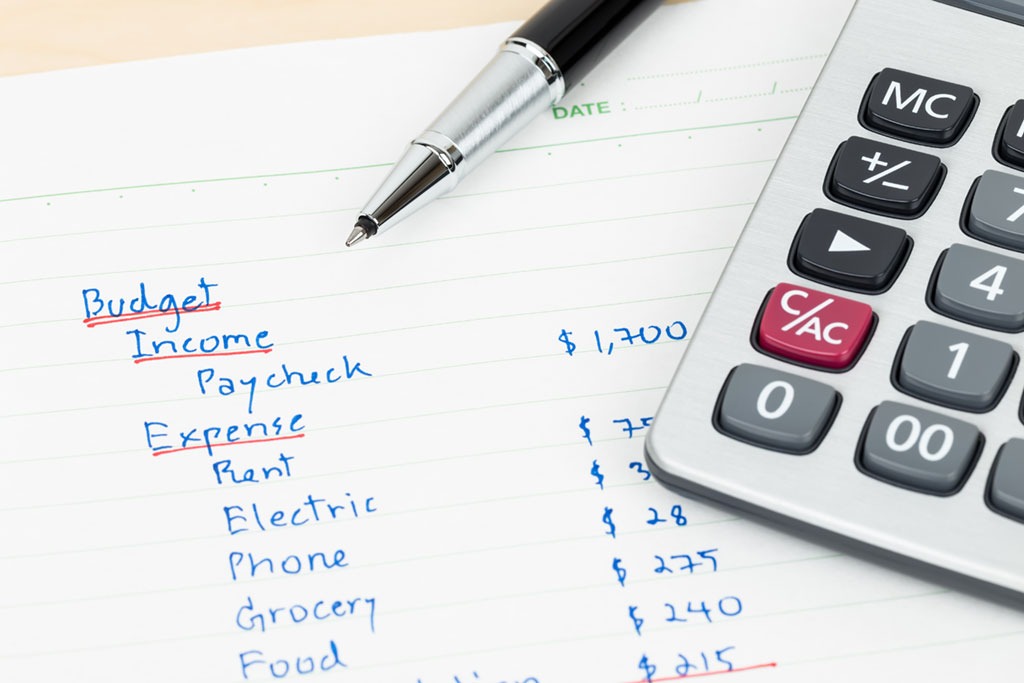
Chris Whitlow, CEO of Edukate, a financial wellness benefit provider, suggests taking this approach before the month begins: write down every expense you have (rent, food, cable, phones, food, transportation, and more). Next, add in upcoming expenses you know you’ll have, such as holiday shopping and insurance renewal. Finally, subtract your income from your expenses until you reach zero.
“It may take some adjustments to get to zero, but once you do, stick to that budget,” says Whitlow. “If you’re spending more than you make, find ways to cut your budget. It could be buying generic items at the grocery store, using coupons, grabbing your morning cup of coffee at home, or finding a side hustle. Conversely, if you earn more than your total monthly expenses, budget for savings and retirement accounts and add those line items to your budget until your income and expenses equal each other.”
20
Don’t Toss, Repair

A nice new pair of shoes or jacket is one of life’s great pleasures, but it’s also the kind of unnecessary expense that can really hit your credit card hard at the end of the month. Instead of replacing worn-out items in your closet (especially ones that are worn because you love wearing them), try to fix them up or take them to a professional. You’ll end up spending less in the long run.
21
Use that 401k plan

If you aren’t taking advantage of your company’s 401k matching program, you’re missing out. “This is free money that you simply cannot leave on the table,” says the blogger who writes under the name Xyz for OurFinancialPath.com. “Elect to contribute automatically every paycheck, set an asset allocation that works for you, and forget about it.”
For any other investments, he suggests using wealth management services from Personal Capital, or setting up an automatic investment schedule with a broker such as Ally.
22
Automate your retirement savings

Speaking of 401k, anyone with one knows the advantages of setting up automatic allocations to a savings or retirement account. When you get your paycheck and the savings have already been pulled from it, you’re not even going to notice how much you are putting away each pay period. This does not have to be limited to retirement savings—consider setting up automatic deposits for other big-ticket items or long-term purchases. Take out $50 each month for a vacation, or $100 for other investments.
23
Save Your Raise

Got a big promotion or bumped up in your salary recently? Set up an automatic savings so that the pay increase is automatically invested or moved into a special savings account. You’ve been doing alright without this extra money each month, so you won’t actually be able to tell the difference.
24
Make Gifts, Don’t Buy Them

It being the holiday season, you are probably feeling pressure to go rack up credit card debt at the store to find gifts for everyone on your list. Instead, consider going a crafty route, or baking something for friends. Some kind of creative concoction, like a scrapbook or a mixtape, is going to cost you much less than a purchased gift, and will be more thoughtful, too!
25
Embrace Those Rewards

Review what rewards your credit card offers and ensure you are taking full advantage of them—or looking for other cards that will provide you with the type of rewards you actually want and will use. “Rewards and cash back can result in thousands of dollars in savings that you may have missed out on otherwise,” says Alex Cohen, CEO and co-founder of Birch Finance.
26
Do a Monthly Financial Cleanse

Just as you get a regular health checkup, conduct your own personal spending checkup each month by reviewing your bills and making sure you aren’t paying for utilities or subscriptions set on autopay that you don’t need.
“Many times, the convenience of setting bills on autopay are great to not miss any payments but can also cost us more if we forget about them,” says Natasha Rachel Smith, a personal finance expert at cash-back and coupon site TopCashback.com. “Every few months go over your payments and cut cost by elimination any subscriptions or services you don’t need.”
27
Save Your Change
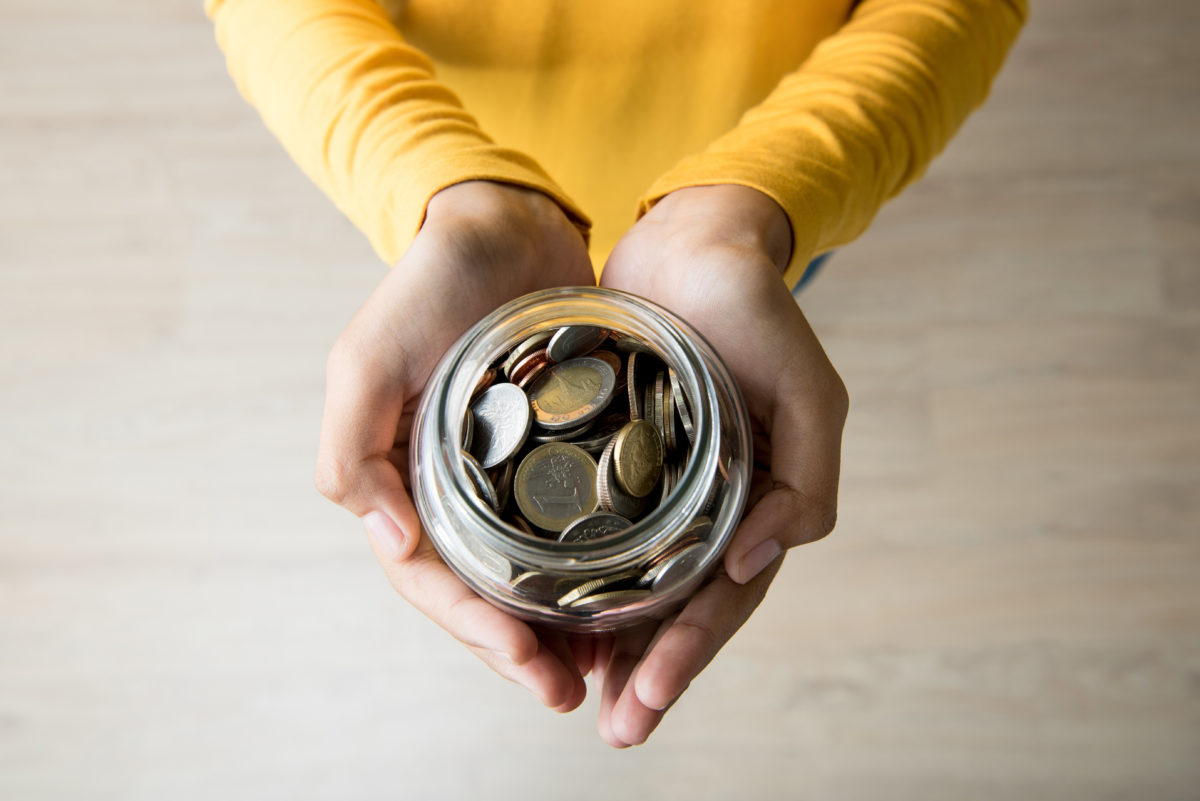
“Whether you throw coins in a bucket at the end of the day or save all the $1 and $5 bills, it will add up fast,” says Smith. “Give it at least 6 months to a year before you move your accumulated change from the bucket to your savings account to give it enough time to grow.”
28
Do a Monthly Financial Cleanse

A high-tech version of the bucket of change strategy are apps like Acorns or Bank of America’s Keep the Change Savings Program, which enables you to round up each purchase you make to the nearest dollar, investing the change. These “microinvestments” will probably not even be noticed, but they can seriously add up.
29
Do a Monthly Financial Cleanse
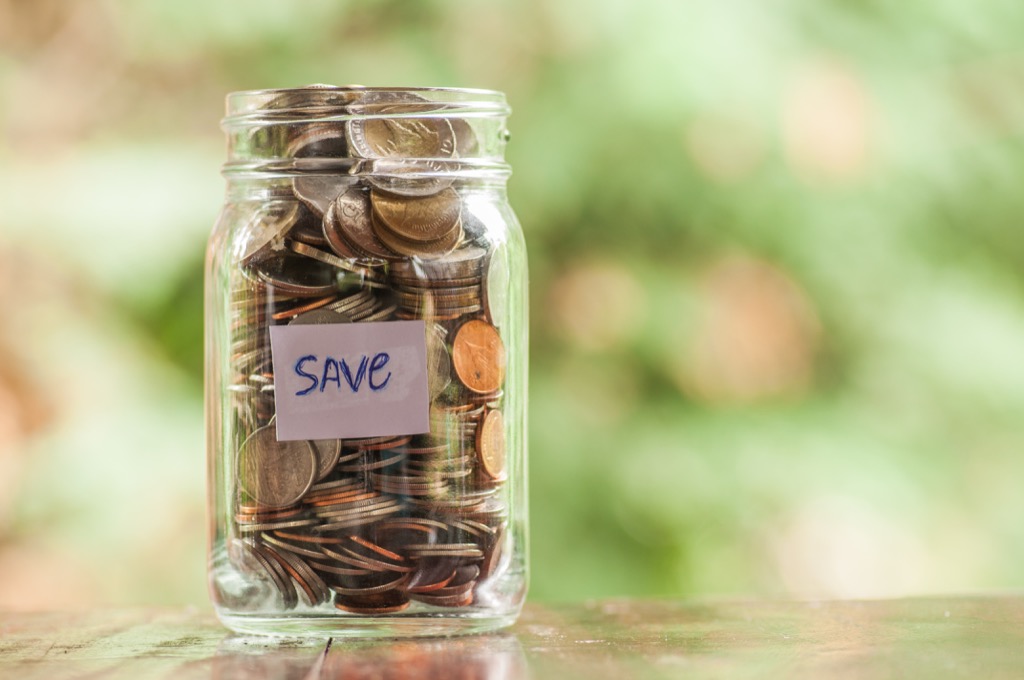
Try putting $1 or $5 into your change jar every day for a month—it may mean cutting down a bit more on the extra spending each day, but at the end of the month, you will have accumulated a healthy amount of cash to deposit.
30
Treat Yourself

Saving money should not be all about the sacrifices you are making—smart saving is just as much about rewarding yourself for being financially responsible. Create periodic rewards for yourself to enjoy for when you hit a budget goal or stick to a savings plan for a period of time.
“Celebrate small wins to keep you motivated on the path to budgeting,” says Smith. “Small wins allow you to stay focused on your goal and not harp on any monetary failures such as overspending. It is a reward in itself to live within your means, but you’ll have extra savings in the end to use towards treating yourself.”
31
Tip Yourself

If you’re someone who’s spent time in the service industry, instead of treating yourself, you might be more interested in tipping yourself. The Tip Yourself app allows you to give yourself a bit of money when you do something you’re happy about.
“It is a cool concept that plays into the psychology of money to help you repay debt, or save for your goals, faster,” says OurFinancialPath.com’s Xyz. “Apps like Pay Off Debt are a great way to manage your debt and chose the most efficient repayment method while staying motivated.”
32
Don’t Forget Coupons

If you are cutting back on eating you, presumably you are also doing more grocery shopping—which means you should be taking full advantage of coupons.
“Coupons are still in the Sunday paper, and there are plenty of relevant apps as well,” says David Bakke, a personal finance expert at the blog Money Crashers.
Apps such as Checkout 51, Ibotta, and SavingStar are all worth looking into.
33
Pay Cash
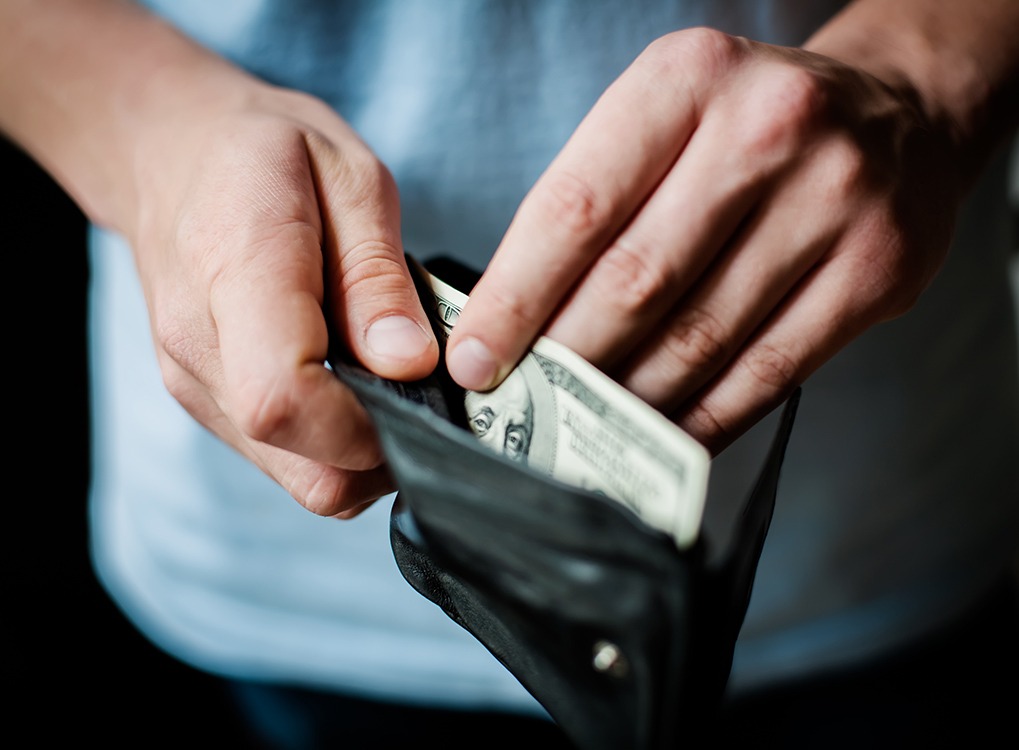
One of the oldest tricks in the money-saving book is to pay with cash instead of credit card. You’re more likely to feel the psychological impact of shelling out $40 when it requires you to pull out two twenties from your wallet than if you just swipe your card and get on with your day. Make a habit of withdrawing a set amount of cash and paying for food, drinks, or other daily expenses using it. The process might seem a little old fashioned, but that’s partly the point. And for more reasons to carry around some Benjamins, read up on Why Real Men Carry Cash.
34
Go With Big Bills
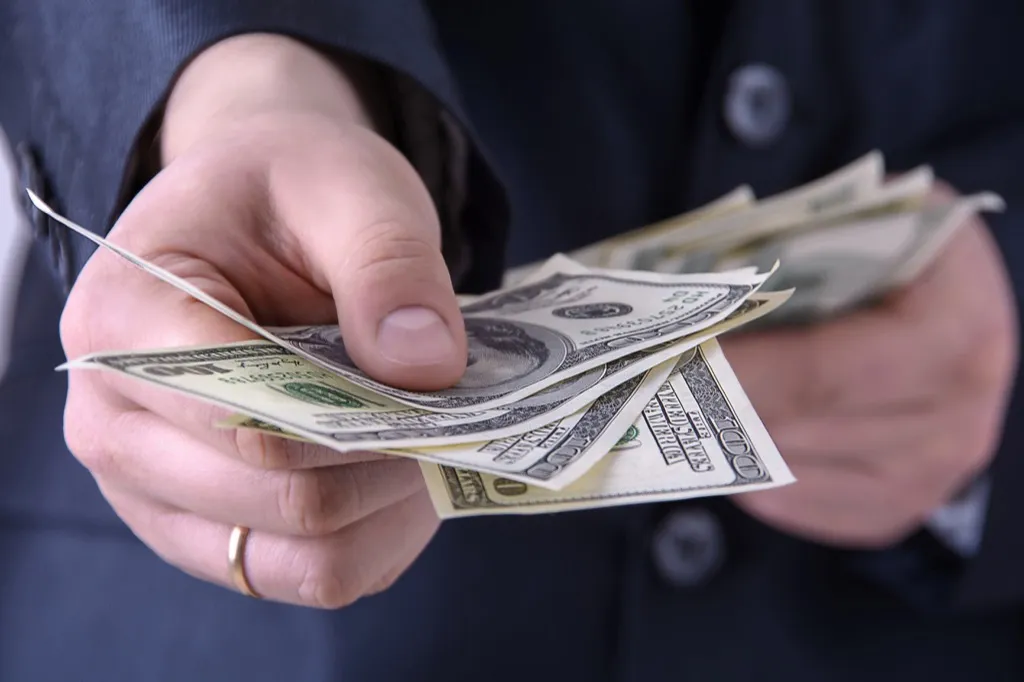
Another way to make cash work to your money-saving advantage: Pay with big bills.
“Believe it or not, carrying larger currency bills (such as a $100) can help you save money,” says Scott W. Johnson, the owner of WholeVsTermLife.com. “Why is this exactly? (1) Because some stores will not take large bills, and (2) Psychologically speaking, breaking the ‘buck’ will bring you anguish. Think of a simple plan this way: let’s say your budget for expenses is $250. Get two $100 bills and ne $50. Try it out and watch how you will have more at the end of the month.”
35
Set Up Withdrawal Road Blocks
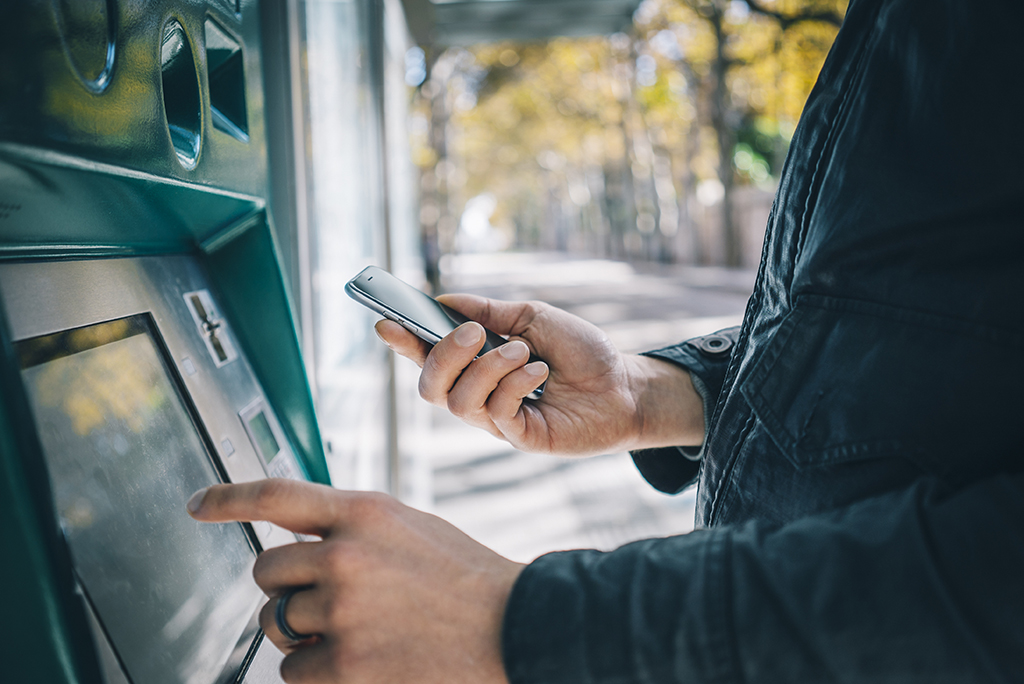
Eliza Cross, who owns the HappySimpleLiving.com, suggests that you make it more difficult to withdraw money from your savings account.
“I set up a monthly automatic withdrawal at my bank for savings, but soon discovered that I kept raiding the savings account to cover small emergencies so the money didn’t accumulate,” she says. “Instead, I opened an ‘inconvenient savings account’ at a credit union a good distance away from my main bank, where I have to drive and speak to a teller in person to withdraw the money. I only use this account for automatic savings, and I declined the debit card they offered me to further discourage temptation. By making it harder to access the money, my account has finally had a chance to really grow.”
36
“Launder” Your Money

Every time you do a load of laundry, put $5 into your savings account. It’s an easy way to make a periodic deposit that will add up over time.
37
Seek Out Free Events

If you live in a town of a decent size, there’s a good chance there are some free shows going on. Seek them out and prioritize outings with a ticket price of zero. It may require you to be a little more creative than just going to a movie, but you will not only save money, you’ll discover something you probably wouldn’t otherwise have thought to check out.
38
Turn Your Home Into the Hangout

Instead of going to a bar where you pay $8 for a beer, invite friends over and encourage each to bring a six pack. You’ll each end up spending less than you would for a night out, and end up with much more to drink.
39
Respect the 30-Day Rule

Tempted to make a big-ticket purchase? Don’t just sleep on it, wait a month. If it’s something you really want and can actually use a month after you were itching to buy it, there’s a good chance it will actually be worth it. But there’s an even better chance you will realize you don’t actually want it that much anymore.
40
Be Grateful

This might not seem like it relates directly to spending, but practicing a more grateful mindset could effectively reframe your thinking about spending in a way that gadgets, lists, or other tricks never could.
“When we practice gratitude, we feel ‘wealthier’ and more prosperous in all ways,” says Yellen. “Our self-esteem is greater and we just generally feel happy and appreciative of many aspects of our lives. Because of this, we’re less likely to crave material goods to feed an emotional need.” And for more tips on maximizing your money, check out the 20 Best Side Hustle Ideas for Putting Your Savings on Steroids.
To discover more amazing secrets about living your best life, click here to sign up for our FREE daily newsletter!